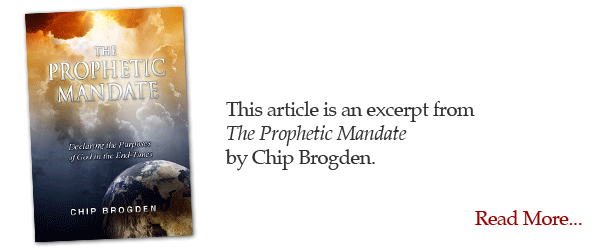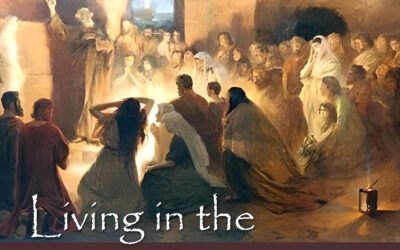This philosophy gives us the illusion of a manageable deity, a “god” who is under our control, having no choice but to respond to a prayer properly worded or recited. A person of average intelligence should be able to see that this is a ridiculous caricature of God – it is a misrepresentation and a deception. The widespread popularity and success of these teachings should make us at least a little suspicious as to the spirit which prompts men to perpetuate it. It cannot be the Holy Spirit.
Jesus takes it for granted that His disciples will pray. This is why four times in a row He says, “WHEN you pray” and not “IF you pray.” But from these brief excerpts of Scripture we learn that there are at least two classes of prayer. One is unacceptable to God, and the other is well-pleasing to Him. One is of hypocrites, the other is of a pure heart. One is done openly to be seen of men, the other is hidden to be seen of God alone. One is nothing more than vain repetition to accomplish my own ends, and the other accomplishes God’s purpose.
Now if we pray the prayer of the hypocrite we are wasting our time. God will not respond, He will not move, He will not listen to such praying. That is not to say that someone (something?) will not answer this self-centered prayer: but the answer, when and if it comes, will not come from the Father in heaven. Much praying is done in vain because the one praying has never gone to the Word to investigate the kind of prayer that is well-pleasing to God. Just as there is a worship that is “spirit-and-truth” and there is a worship which is fleshly and vain, so there is a “spirit-and-truth” sort of praying and a flesh-and-blood praying which is done in vanity.
So by the grace of God we would like to look to the Lord to teach us to pray. Let us ask Him to show us the sort of praying that is acceptable to Him.
How Not to Pray
“And when you pray, do not be like the hypocrites, for they love to pray standing in the synagogues and on the street corners that they may be seen by men. I tell you the truth, they have already received their reward” (Matthew 6:5).
What makes a prayer hypocritical? It is a prayer which is done in public to be seen of men. It is an outward show to make one appear spiritual to others. It calls attention to one’s self through loud volume, lengthy discourse, or spiritual-sounding vocabulary. It is primarily done for ceremonial benefit only, for the listening ear of men, and not for God. We want to be seen and heard and observed. We wish to be known as “prayer warriors” so we prefer to do our praying in public, by the altar, in church, or at the prayer meeting, so everyone can see us. We would have people know us as watchmen, prophets, and intercessors. But what matters most is not how people perceive us, but how we truly are before God.
Hypocrites typically use public praying to preach or make demands upon others. I was in a meeting once when a newcomer was asked to pray. Before long he began talking about his financial needs as if he were talking to the Lord, but it should have been obvious that he was merely letting it be known to all present that he expected a monetary gift. He even said, “I pray that someone will give me the money I need.” And of course, after the meeting, someone did. But neither the one who prayed nor the one who “answered” his prayer were in the Spirit. This man should have been rebuked, but no one rose to the occasion, including myself. So we all missed the Spirit, but we learned a lesson. And we never heard from the man again.
Preachers are equally guilty of hypocritical long-windedness. It is interesting to observe how differently someone prays when standing upon a platform before others compared to how they pray in other places. They seem to believe that the spotlight calls for certain words and phrases to be used that they would not otherwise use. This, too, is done for the benefit of the listeners. “Oh, he can pray such powerful prayers!” they exclaim. But this does not mean they are necessarily powerful with God.
Particularly in a day when prayer meetings, prayer gatherings, prayer retreats, and prayer warfare is being emphasized, it is important to understand what the Lord is looking for so we do not fall into a trap of vanity. The experience of many saints seems to indicate that the more we pray in private, the less we will pray in public. The words will be fewer, but they will be far more weighty and valuable. One brother was so broken before God privately that whenever he stepped into the pulpit to pray publicly, all he could do was fall over the lectern and weep, “Oh God!” That is the proper spirit, and how I wish we had more of this kind of prayer.
“But when you pray, enter into your closet, and after you have shut the door, pray to your Father in secret; and your Father, Who sees what is done secretly, will reward you openly” (Matthew 6:6).
Why does the Lord prefer secret prayer to prayer done in the synagogue (or in the church building)? Prayer which is most valuable to God is done in secret, in the prayer closet, in the inner chamber where no man’s eyes can see and no man’s ears can hear what is said and done. Thus, everything said and done in secret is for the Lord’s sake. Most public praying is done to be seen of men; hence, it has virtually no worth. An abundance of public prayer cannot make up for a lack of secret prayer.
As a child I took this Scripture literally. I would go into a closet and close the door, praying to the Lord in secret. When I got older I would climb to the top of a tree to pray and read. Or I would sneak out while it was still dark so I could pray. As I look back on my life these are the sweetest times of prayer and communion I have ever experienced.
It does not matter whether your closet is a literal closet or not. The issue is the sort of prayer that is offered, whether it is done to be seen of men or if it is done to be seen of God. If we are praying to the Lord for the Lord’s sake then we will want to keep holy things holy, private things private, and sacred things sacred. We will not easily repeat to others the intimate details of these encounters with God. It would seem almost sacrilegious to do so.
Is prayer and worship a lifestyle, or is it an event? If it is an event, if most of our praying is done once a week when we gather together, then we will be lacking spiritually. We will sense this lack when we try to flip a switch and become spiritual enough to pray. But our corporate prayers have their basis in our secret prayers. The real value is not what is seen outwardly, but what we are inwardly, beneath the surface, as we minister to the Lord in secret.
“But when you pray, do not use vain repetitions as the heathen do: for they think they will be heard for their much speaking” (Matthew 6:7).
The Greek word for “vain” here is interesting. It comes from the base of another word which means “to handle or squeeze” and implies manipulation, as someone would manipulate clay to make it into something like a bowl or a vase. It is used by Jesus in another context, Matthew 15:7-9:
“You hypocrites, well did Isaiah prophesy of you, saying, ‘These people draw near to Me with their mouth, and honor Me with their lips, but their hearts are far from Me, for in vain do they worship Me, teaching for doctrines the commandments of men.'”
There is such a thing as vain prayer and vain worship. There is such a thing as a sacrifice acceptable to God and a sacrifice unacceptable to God (see the story of Cain and Abel in Genesis 4). We know exactly what God seeks, and that is, “Spirit and Truth.” We also know what He considers to be vanity, manipulation, a waste of time, and self-centered. Vanity includes drawing near to Him with our mouth and honoring Him with our lips while our heart is far from Him. It includes teaching the things of man as if they were the things of God. It includes repeating the same prayers over and over again with a view towards manipulating God. It includes 95% of all that is said and done in a typical church service on Sunday morning. Continually asking God to bless our unacceptable worship every single week is an example of vanity. “In vain do they worship Me.”
It may come as a shock and a surprise to most people to learn that much of what they are doing, even the spiritual things (especially the spiritual things), are vanity. People have been taught that so long as they attend church and pray the right prayers for protection, blessings, power or anointing then everything will be well with them. People who relate to God in this way are behaving like heathens – Jesus says so. Heathen people are not irreligious. They worship! They pray! Hypocrites give! Hypocrites fast! Hypocrites do mighty works in the Name of Jesus! But according to Jesus, it counts for nothing. It is all in vain. They do not really KNOW Him, and He does not “know” them either.
“Do not be like [the heathen], for your Father knows the things you need before you ask Him” (Matthew 6:8).
Here is something interesting! Jesus says not to pray as if we would be heard for our much speaking or grandiose speech, because the Father knows what we need before we ask Him. Well then! What is the point of praying? If God knows what I need before I ask, why ask at all? If prayer is nothing more than making my needs known to God then perhaps we can stop praying, since He already knows what they are. But perhaps prayer, as Jesus teaches it, has very little to do with making requests to the Lord for my own needs to be met. If so, then to continue praying on the basis of my needs is vanity. Vanity is not only futility, but it is self-centeredness. Thus, “Do not be like the heathen, who vainly repeat the same prayers with a view towards getting their own needs met.”
Jesus does not say that since the Father knows what we need, we do not HAVE to pray – but if He already knows what we need then it should definitely change the WAY we pray. When we do pray we should not behave like a hypocrite or a heathen, obsessed with ourselves. Our needs are already known to the Lord. So it is not as though we have to go to God and inform Him as to the details of our situation in order to fully appraise Him of what is happening. We might give our doctor such detailed information so a proper diagnosis can be made, but the Lord does not need any assistance from us in order to help Him figure out the problem. Nor does He need us to tell Him what needs to be done, as if we know what is called for and He does not.
What if prayer is something deeper than rehearsing my needs to the Lord? What if prayer is a means toward a higher end than getting my circumstances and my surroundings in order? In other words, what if prayer is not about my needs, my desires, my wants, my requests, or my situation at all? What if prayer is meant to meet the LORD’S need? What if, instead of coming to the Lord with OUR expectation as to the outcome, we come to the Lord, interested in knowing what HIS expectation is? What if prayer is not about giving voice to MY will at all, but is about giving voice to HIS will?
This concept may be too radical for some, because it will require a further death to their Self. But since the Father knows what we have need of before we ask, prayer must not be primarily concerned with telling Him what He already knows. Since we are to pray, and since the Lord knows our needs already, does this not indicate a higher calling and a deeper work to be done in prayer than merely voicing my personal prayer requests? To the heathen and the hypocrite, who are so absorbed with Self, vanity (futility and self-centeredness) is evident everywhere, and in their praying in particular. According to the Scriptures, it appears that Jesus is bringing us to a deeper understanding of prayer. So after what manner SHOULD we pray then? Jesus makes it very plain.
How to Pray
“Pray after this manner: ‘Our Father in heaven, may Your Name be hallowed, may Your Kingdom come, may Your Will be done: as in heaven, so in earth'” (Matthew 6:9,10).
Now that we know the kind of prayer which is not acceptable to the Lord, it is time for us to look at the kind of prayer which is acceptable. The Lord Jesus is not giving us a prayer to repeat word for word, for that would be contrary to everything He has told us up to this point (observe how we still cling to it ritualistically anyway). Instead, He gives us a pattern, a prototype, a foundation of all prayer by saying, “Pray after this manner”, or, “Pray along these lines.”
At once we are lifted up from the earthly situation and are made to focus upon a heavenly Father, a heavenly Kingdom, and a heavenly Will. I believe it is so important for us to see this. Prayer does not begin on the earth, it begins in the heavens. It does not begin with man, it begins with the Father. It does not begin with man’s need, but with God’s will. Our praying is ineffectual because we pray as earthly men with an earthly perspective concerning earthly things. See how far and above this manner of praying is when compared to the hypocrite, praying in public to be seen of men! Prayer ought to bring us up into the heavenlies, not bring us down deeper into the earth. It ought to focus our vision on the Father, not on man, or the problems of man. Spiritual prayer begins in the Spirit; heavenly prayer begins in the heavenlies.
When we pray “after this manner” we are transported and elevated beyond flesh-and-blood, beyond the natural, beyond the earthly, beyond the seen-and-felt universe in which we live. We are at once brought into alignment with Someone larger than ourselves, Someone higher, Someone greater. This Someone has an agenda, and is working all things together in one accord towards this agenda. What is the agenda? It is the Will and the Kingdom. So what is the Will and the Kingdom? The Will is “all things in Christ” and the Kingdom is the fulfillment of that Will, when Christ has the preeminence. All of God’s movements are towards this End.
So the chief objective of prayer is to bring us into cooperation with the Father so that we are harmonious with Him – with respect to our love relationship as well as our working relationship. Much time and effort in prayer is spent trying to get God involved with OUR agenda, with OUR plans, with OUR goals, with OUR cause, with OUR needs, real or imagined. But after all, who is the Master? Who is the servant? Whose will are we seeking anyway: ours, or His? If we have not touched upon the Will and the Kingdom in our praying then we are praying in vain, because God cannot contradict Himself, and cannot answer such prayer. If our agenda is not harmonious with His then our agenda has to go. Most of our prayers are simply too small, too narrow-minded, and too constricted. We do not see anything beyond our present surroundings. We have not seen the big picture. We do not have a heavenly perspective. So to begin with we must empty ourselves of all preconceived ideas and seek the Lord’s Will and the Lord’s Kingdom when we pray, for this truly hallows the Father.
“Give us today’s bread again as usual; and as we have forgiven others their sins, so forgive us our sins'” (Matthew 6:11,12).
The Lord does not tell us NOT to make our requests known to Him. It is appropriate to thankfully acknowledge Him on a daily basis as our Provider and the One Who forgives. The difference is this. When we pray the Will and the Kingdom, when we lose ourselves and our agenda, when we come to the Lord to meet His need, then we will find our needs are met: but even if they are not met, we will not care. Our desire is for Him, and so long as we are in His Will and in His Kingdom, the issue of whether or not my personal needs are met becomes of secondary importance. Prayer is not the vehicle whereby I get my needs met. It is the means through which God’s Need is met. Now that I am praying on behalf of God’s Will and God’s Kingdom, now that I am praying in alignment with God’s desire for the ages, He will be sure to supply me with what I need (indeed, nothing can prevent it, for nothing has been able to prevent it for billions of years). As I have sought first the Kingdom, all that is required will be added to me. Not for my sake, you see, but for His sake. As I have vested myself into His Kingdom, He has vested Himself into my well-being. How could it be otherwise?
For after all, where is the Kingdom? Here, or there, in the future, in the past? No, the Kingdom is within you (Luke 17:21). When we pray God’s Will and God’s Kingdom, are we not asking for Christ to increase and for us to decrease? Are we not asking for Christ to have the greater preeminence in us individually as disciples? For the moment, forget about bringing the Church together or getting everyone to see the same thing. If each of us prayed this with no greater goal but for ourselves, would this not by extension include the entire Church, of which we are members? So we are praying for Christ to have the preeminence in us individually as disciples; in the Church corporately; and in all of creation collectively. We are aligning ourselves with some very powerful forces, all working together towards God’s Ultimate Purpose.
Now whether or not you consider the bread to be physical or spiritual (or both), it is provided daily. And, on a daily basis, forgiveness of sins is provided. Bread speaks to our Life, and forgiveness of sins speaks to our walk. Daily we require Life in order to live. Daily we offend others, and daily we offend God. So daily we have need of forgiveness. Quite frankly, whatever else we may think we need is summed up into these two things. Everything else is good to have, and God may be pleased to grant them, but they are not absolutely necessary. No one has a Scriptural “right” to make demands upon the Father for whatever they want, no more than my children should expect me to give them everything they ask for.
Since we are already blessed with every spiritual blessing in Christ (Ephesians 1:3), the bulk of our prayers ought to be centered on God’s Will and not our wants. UNLESS – and here is where it gets interesting and powerful – UNLESS what WE want is what HE wants. God will deny no prayer that is in agreement with what He Himself wants to do. In fact, He is the One Who makes His Will known to us, so we can voice our agreement to it in prayer, so it will come to pass. Conformity to Christ includes wanting what He wants, and if this is taking place in us, the first place it will manifest itself is in our praying, for this is where the exchange of His Life for my life is taking place. And by now we should already know that God only wants ONE THING. Eventually, that is all we will want, and that is all we will be able to pray. The easiest way to get your wants met in prayer is to only want ONE THING.
“Lead us not into temptation, but deliver us from evil: for the Kingdom is Yours, the Power is Yours, and the Glory is Yours. May it be so forever'” (Matthew 6:13).
As we begin with the Kingdom, so we end with the Kingdom. On what basis may we claim deliverance from evil? On the basis that the Kingdom is of God, the Power is of God, and the Glory is of God.
What is evil? All that is of Antichrist is evil. Antichrist resists God’s movement towards Christ as All in All. Whether or not this culminates in a last days dictator is beside the point. Antichrist has been with us from the beginning. The spirit of Antichrist has always resisted the preeminence of Christ, from Lucifer’s rebellion to the sins of your flesh. A thing does not have to be bad to be evil. It could be as an angel of light. Of course, bad things are evil, but even seemingly good things are evil if they are not bringing us further into Christ as All in All. So if God’s Highest Good is Christ, then anything less than Christ or apart from Christ is evil.
So many are under the impression that the devil has a kingdom, but a search of the Scriptures fails to produce a single shred of evidence to suggest this. “Thine is the Kingdom.” The Kingdom belongs to God. God never gave anything to the devil. Even in the Old Testament, before Jesus walked the earth, it is said, “The earth is the LORD’S, and the fullness thereof: the world, and they that dwell therein (Psalms 24:1).” Again, many are obsessed with the alleged “power” of darkness, and anyone who has the ability to deceive another has the ability to control them, but here we are told “Thine is the Power.” There is no intrinsic power of darkness, there is only power over individuals gained through deception. The True Power is not held by darkness, but by God, through Jesus Christ, in heaven as well as in earth (Matthew 28:18). Finally, “Thine is the Glory.” It is this Glory of Christ as He in fact is that manifests to us by revelation, and this Glory is indeed manifested in the heavens as well as in the whole earth (Psalms 8).
Now if we carefully look at these three items – the Kingdom, the Power, and the Glory – we see that it is as much for earth as it is for heaven. It truly represents all that “as in heaven, so in earth” means. Yet there is, on the earth, something which seems to challenge the preeminence of Christ, as if to say that there is another Kingdom, another Power, and another Glory, whether it be of men or of satan (Luke 4:5,6). To pray in this manner is to declare otherwise. It is to stand upon the earth and give testimony that there is only One Kingdom, One Power, and One Glory, and these belong to the Father and to His Christ. Of course, we must see this and believe it in order to pray it. But this, essentially, is the Testimony of Jesus and the ministry of the overcomers.
The thing which hampers our praying the most is the smallness of our vision. Prayer is only a means to an End, and the End is to see Christ established as the Preeminent One on the earth as in heaven. Prayer aligns us with the heart of God so that we only desire the One Thing that He desires.
We cannot, we should not, have faith in prayer itself. How easy it is to put our confidence in a method or a technique for praying and begin relating to God like a heathen. How easy it is to put our confidence in man and begin relating to God like a hypocrite. It is interesting to see that as powerful as “the Lord’s Prayer” is, it is nevertheless done behind closed doors, and in secret. We are not told that we must go to strategic points on the globe in order to exercise our authority. We are not given the names of demons or principalities with which we must engage ourselves. Not at all. In our prayer closet, once the door is shut, we merely pray in this manner to the Father, and He will reward us openly.
And lest we forget, Christ is our reward. We seek not His things, but Him. We seek not our Kingdom, but His. We rely not in our power, but in His. And as we are decreased, He is increased, and His glory is revealed and made manifest in us and through us. This is true prayer, provided we are willing to leave our ground and come onto His ground, praying His Will and not ours.
O Father, reveal Your Son in us. Teach us to pray. Your Name be sanctified. We stand for your Kingdom and for Your Will in the earth. May Your Kingdom come – in us. May Your Will be done – in us. As in heaven, so in earth. We thank you that as we seek first Your Kingdom, everything we need is provided. Deliver us from all that is Antichrist, from all that is natural, from all that is flesh-and-blood, from all that is carnal, from all that is earthly, and establish us in the Kingdom of Your Dear Son. We recognize no kingdom but Yours, no power but Yours, no glory but Yours. May it be so forever. Amen.













